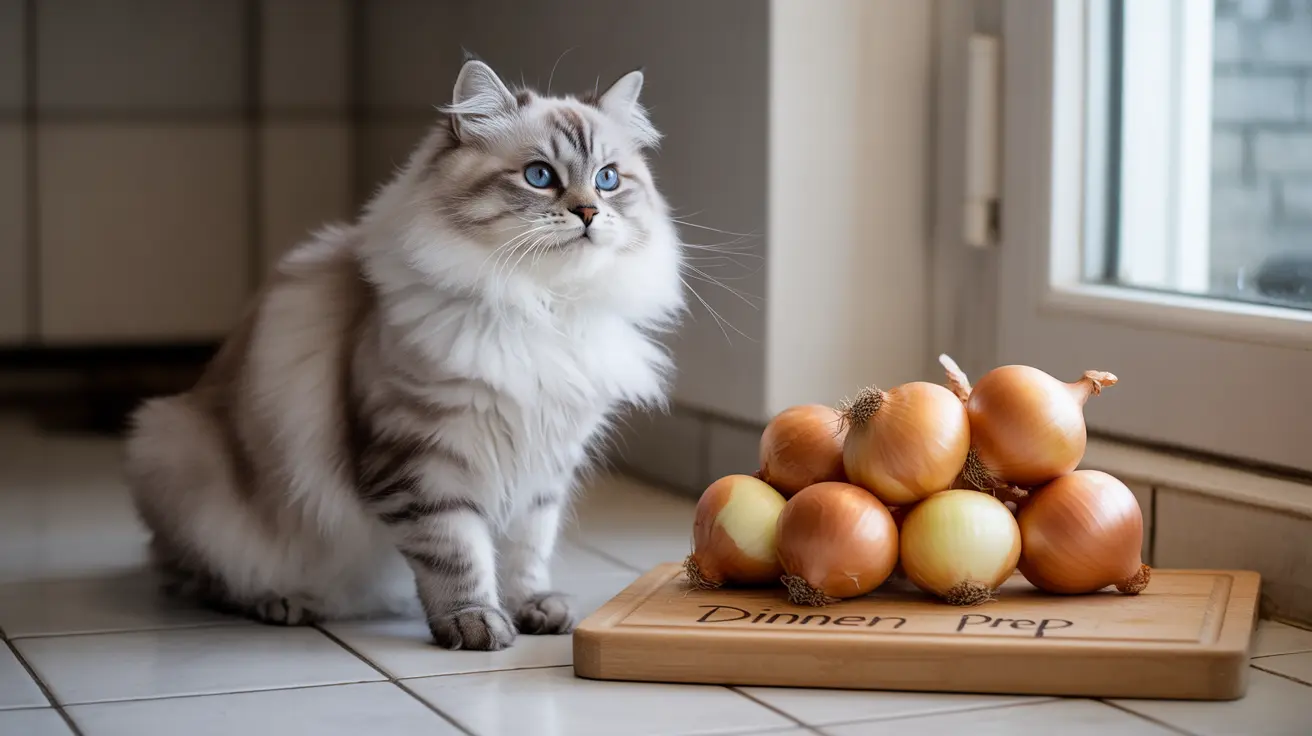As a cat owner, knowing which foods are dangerous for your feline friend is crucial for their health and safety. While cats are naturally selective eaters, they can still be curious about human foods that could potentially harm them. This comprehensive guide will help you understand exactly what cats cannot eat and why certain foods are toxic to our feline companions.
From common kitchen ingredients to seemingly innocent snacks, many everyday foods can cause serious health issues in cats, ranging from mild digestive upset to life-threatening conditions. Let's explore these dangerous foods and learn how to keep your cat safe.
Common Kitchen Ingredients That Are Toxic to Cats
Allium Family: Onions, Garlic, and Related Plants
The allium family, including onions, garlic, leeks, chives, and shallots, poses one of the most serious threats to cats. Even small amounts can cause severe anemia by damaging red blood cells. Just 5 grams of onion per kilogram of a cat's body weight can lead to dangerous complications.
Even powdered forms of these ingredients can be hazardous, making it essential to check ingredient labels on any human food your cat might access.
Chocolate and Caffeine
Though cats are less likely than dogs to seek out sweets, chocolate remains a serious hazard. Dark chocolate is particularly dangerous due to higher concentrations of theobromine and caffeine. These substances can cause:
- Increased heart rate
- Restlessness
- Vomiting
- Seizures
- Potentially death
Surprising Foods That Can Harm Your Cat
Grapes and Raisins
While the exact toxic compound remains unknown, grapes and raisins can cause sudden kidney failure in cats. Even a small amount can be dangerous, with symptoms appearing within 12-24 hours of ingestion.
Raw Foods and Dough
Raw eggs, meat, and dough present multiple risks to cats. Raw dough can expand in the stomach, while raw animal products may harbor dangerous bacteria. Additionally, raw eggs contain an enzyme that interferes with biotin absorption, potentially leading to skin and coat problems.
Hidden Dangers in Common Household Items
Artificial Sweeteners and Seasonings
While xylitol toxicity is more commonly associated with dogs, cats should still avoid artificially sweetened products. Additionally, many seasonings and spices can cause digestive issues or worse in cats.
Dairy Products
Despite popular belief, most adult cats are lactose intolerant. Feeding them milk, cheese, or other dairy products can lead to digestive upset, diarrhea, and discomfort.
What to Do in Case of Toxic Food Ingestion
If you suspect your cat has eaten something toxic, immediate action is crucial:
- Contact your veterinarian or emergency animal hospital
- Note the substance and amount consumed
- Watch for symptoms and follow professional guidance
- Never induce vomiting without veterinary instruction
Frequently Asked Questions
What human foods are toxic to cats and should be avoided?
Cats must avoid onions, garlic, chocolate, caffeine, alcohol, grapes, raisins, raw dough, and many common seasonings. Even small amounts of these foods can cause serious health issues.
How can I prevent my cat from eating harmful foods like onions and chocolate?
Store dangerous foods in secure containers and cabinets, clean up cooking scraps immediately, and never leave toxic foods unattended. Educate all household members about foods that are dangerous for cats.
What are the symptoms of food poisoning in cats, and when should I seek emergency care?
Watch for vomiting, diarrhea, lethargy, weakness, excessive thirst, or unusual behavior. Seek immediate veterinary care if you notice any of these symptoms or suspect toxic food ingestion.
Can cats eat dairy products like milk and cheese?
Most adult cats are lactose intolerant and should avoid dairy products. While small amounts might not cause serious harm, regular consumption can lead to digestive issues and discomfort.
What should I do if I suspect my cat has ingested something toxic?
Contact your veterinarian or pet poison control immediately. Don't wait for symptoms to appear, as early intervention can prevent serious complications.
Final Thoughts
Understanding what cats cannot eat is crucial for their health and longevity. Keep toxic foods safely stored away, maintain a regular feeding schedule with appropriate cat food, and always consult your veterinarian before introducing new foods to your cat's diet.
Remember, prevention is always better than treatment. When in doubt about a food's safety for your cat, it's best to err on the side of caution and avoid offering it altogether.






